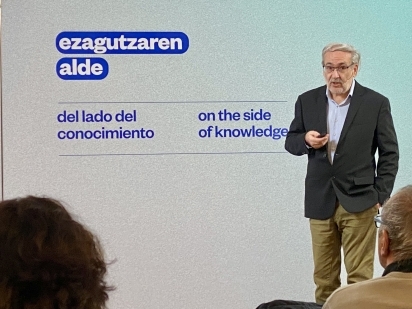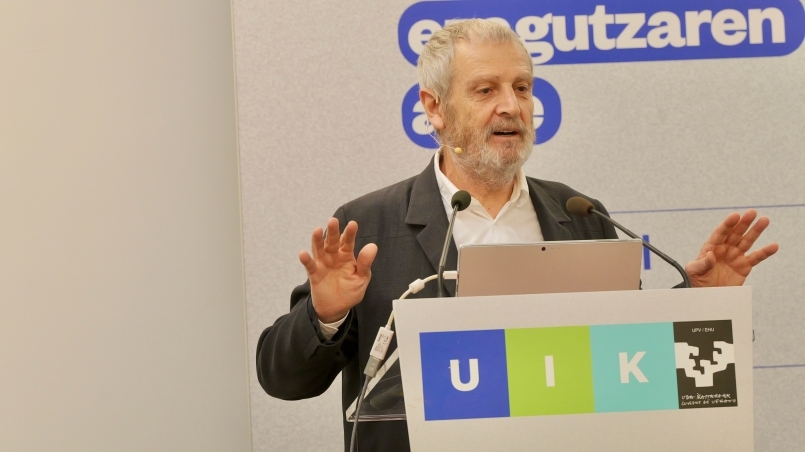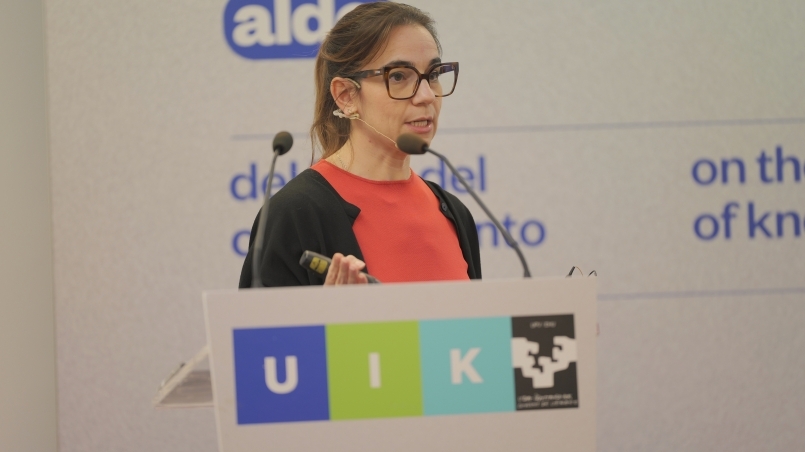Antonio Cerrillo, environmental journalist: "Overcoming eco-anxiety requires measures aimed at building and not continuing to watch and do nothing"
The diagnosis of the climate crisis, the debates surrounding the new paradigm of prosperity and the participation of social movements in the search for solutions were the focus of a new day of talks organised by the Donostia Sustainability Forum. The guest speaker on this occasion was journalist Antonio Cerrillo, environmental editor of the newspaper La Vanguardia and author, among others, of the book "Crisis climática. Un viaje por los escenarios del cambio climático en España y su impactos”.

Throughout a talk in which the interest in pedagogy was very present, Cerrillo detailed the factors influencing the environmental crisis, gave some insight into the debates surrounding new visions of the economy and explained the role played by social movements in tackling solutions to the climate crisis. In his opinion, "overcoming eco-anxiety requires measures aimed at building and not continuing to watch and do nothing".
Diagnostic
The climate crisis is unprecedented and many of its effects are already irreversible, according to the IPCC's 2021 report. Rising temperatures are the result of greenhouse gas emissions produced by the use of oil, coal and gas. This, the Catalan journalist pointed out, is something that a large majority of citizens are aware of. According to the surveys he provided, more than 80% of Spaniards are aware of the problem of climate change and know what measures should be taken. They think, in fact, that it will be the main problem in 10 years' time and they are asking governments for more climate action measures.
Overcoming this situation will require huge social and economic transformations, Cerrillo explained. A change in the energy and transport model is not enough, because other sectors also have impacts, from land and waste management to tourism and finance.
Solutions are on the table, he added: Emissions must be reduced by 43% by 2030 compared to 2019 if a global average temperature increase of more than 1.5 degrees is to be avoided, according to the IPCC's 6th report. However, the responses of the different countries are not on the same path. "To meet the objectives of the Paris agreement, the world must reduce greenhouse gas emissions to unprecedented levels", added Cerrillo.
One example he gave was related to the search for solutions to emissions in the agri-food sector, mainly the commitment to diets with little meat and produced in a sustainable way. In addition, he added, "when it comes to providing solutions, we need to talk about changing values in relation to global justice, since the richest 1% of the world's population causes twice as much carbon emissions as the poorest half of humanity".
He asked if another capitalism is possible. In response, he detailed initiatives being put to governments, ranging from ending fossil fuel subsidies, creating a polluter's tax and a regulation against imported deforestation.
New economic models
In his talk, Antonio Cerrillo set out the premises that are being put forward for new economic models. The new prosperity, he explained, is based on the idea of a slow economy, without growth, a model aimed at saving the planet and gaining well-being. This new economy relies on initiatives such as community energy projects, local farmers' markets and local repair and maintenance services. "It's an economy less obsessed with resource extraction, with energy consumption, and I call it Cinderella because so far it has been left behind, but there are those who think it can help people achieve greater well-being and fulfilment than a materialistic economy".
He also referred to the theories of degrowth, one of the fundamental premises of which is to admit the limits of growth as a moral imperative. As he explained, "we must stop linking development with the waste of materials: give the planet a break and opt for services that leave a small ecological footprint. This is the recipe for putting the economy on a diet and having a fit planet: light consumption of materials, low-CO2 jobs and social and health services ".
The role of journalism
Antonio Cerrillo explained what premises journalism must fulfil in order to report on climate change: rigour, plurality, facing up to pressures, specialised training, tackling corporate image-washing, prioritising pedagogy and avoiding catastrophism but giving scientists a voice.
During the talk, Cerrillo pointed out that it is up to journalism to alert the public to incorrect information. Disinformation and image-washing by large corporations are, in fact, two of the obstacles on the road to energy transition, along with political inaction and "light denialism" which, according to Cerrillo, does not translate into statements, but into actions such as the solar tax introduced by the PP government.
Citizen action
NGOs have become a key agent in demanding more decisive action from administrations to promote climate action, according to Antonio Cerrillo. Their reports are very rigorous and allow them to balance other forces, from other sectors, with other interests, which enriches plurality. Another example of social action he cited was the Citizens' Climate Assembly, "which has not had much impact, and which made proposals such as teleworking or the 4-day week, forcing electricity companies to use renewable sources for the majority of their production, and reducing the number of large-scale industrial livestock farms".
He also cited movements such as Extinction Rebellion and Teachers for future, as well as other youth-driven organisations. Young people, he added, are affected by eco-anxiety, anxiety and powerlessness in the face of the lack of solutions to the environmental crisis. But this eco-anxiety, he added, can be a lever for mobilisation. To overcome this anxiety, he explained, one can form part of social collectives, work on the recovery of ecosystems and promote new forms of governance, such as citizens' climate assemblies, among other ideas. "Overcome eco-anxiety with measures aimed at building and not continuing to watch and do nothing," he concluded.


